André Nox (1869-1946) was a French actor who worked in the cinema from 1916 till 1940. During the silent era, he starred in French and German films. After the sound film was introduced, he mainly played supporting parts.

French postcard by Cinémagazine-Edition, no. 57. Photo: Gibory.
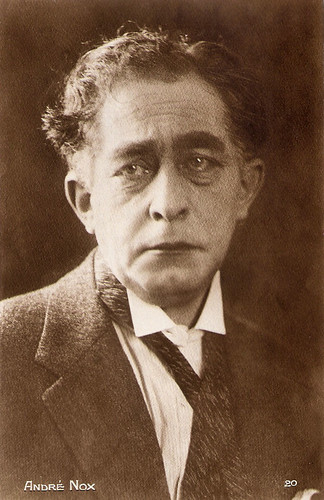
French postcard by Editions Cinémagazine, no. 20.
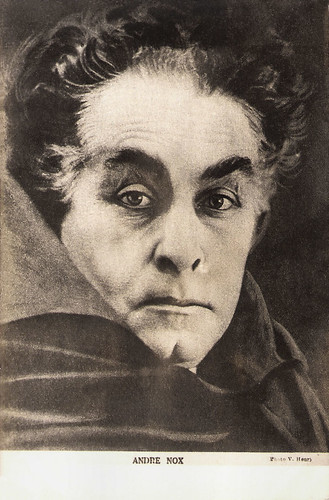
French postcard. Photo: V. Henry.
André Nox was born as Abraham André Nonnes-Lopes in 1869 in Paris, France. He was sometimes credited as André Nonnez. He came from a family of Jewish notables and was the nephew of dramaturge and author Georges de Porto-Riche. After his studies, he worked in finance before joining the army at the very beginning of the First World War. Demobilised in 1916, when he was about fifty, he abandoned his business to try a career in cinema, which was booming at the time.
He made his cinema debut for Les Films Succès in the short silent film Sous les phares / Under the lights (1916), directed by André Hugon. He next starred in the silent Western Les chacals / The Jackals (André Hugon, 1917), also starring Louis Paglieri and Musidora. For Huron, he also appeared in Vertige / Vertigo (André Hugon, 1917) starring Régine Marco, the crime film Requins / Sharks (André Hugon, 1917) starring Charles Krauss, Johannes, fils de Johannes / Johannes, Son of Johannes (André Huron, Louis Paglieri, 1918) with Musidora, and La Fugitive / The Fugitive (André Hugon, 1920) starring Marie-Louise Derval.
He signed a contract with Gaumont and acted in Léon Poirier's Âme de Orient / Soul of the Orient (1919), filmed in Nice with Madeleine Sève, Charles Dullin and the very young Josette Day. Then he played in Poirier’s Le Penseur / The Thinker (Leon Poirier, 1920), a philosophical drama based on an idea of Edmond Fleg, with Marguerite Madys and Armand Tallier. Pascal Donald at CinéArtistes calls it “certainly his best role (…) With his pepper and salt hair often shaggy, his face with powerful features and his dark eyes, he is the perfect interpreter of poignant dramas.”
For Germaine Dulac, Nox appeared in her La mort du soleil / The Death of the Sun (1922). He played a musician in Le quinzième prélude de Chopin / The Fifteenth Prelude of Chopin (Victor Tourjanski, 1922). In 1925, he appeared opposite Conrad Veidt in the French silent historical film Le comte Kostia / Count Kostia (Jacques Rober, 1925), set in Tsarist Russia. He had a supporting part in the drama La femme nue / The Nude Woman (Léonce Perret, 1926) starring Iván Petrovich, Louise Lagrange and Nita Naldi, and based on a play by Henry Bataille.
In Germany, he appeared with Carmen Boni, Werner Krauss and S.Z. Szakall in the silent film Der fidele Bauer / The Merry Farmer (Franz Seitz, 1927), based on the 1907 operetta of the same title, and in Die Hölle der Jungfrauen / The Hell of Virgins (Robert Dinesen, 1928) with Werner Krauss and Elizza La Porta. Back in France, he appeared with Betty Balfour and Jaque Catelain in the drama Le diable au Coeur / Little Devil May Care (Marcel L'Herbier, 1928). One of his best films is Verdun, visions d'histoire / Verdun, Historical Visions (Léon Poirier, 1928), a dramatic re-enactment of the battle of Verdun during World War I, as seen by both French and German sides. In Germany, he also made the silent drama S.O.S. Schiff in Not / Ship in Distress (Carmine Gallone, 1929) starring Liane Haid, Alphons Fryland and Gina Manès.

French postcard by Ciné-Cartes G., Paris. Photo: Fox Film / Paris Film Production. André Nox as Claude Saint-Hesme and Henri Baudin as Old Robert, the main character in L'Homme qui pleure (Louis d'Hee, Louis de Verande, 1922). Épisode : L'anathème.

French postcard, by Editions Filma in the Les Vedettes du Cinéma series, no. 85. Photo: Fox-Film.
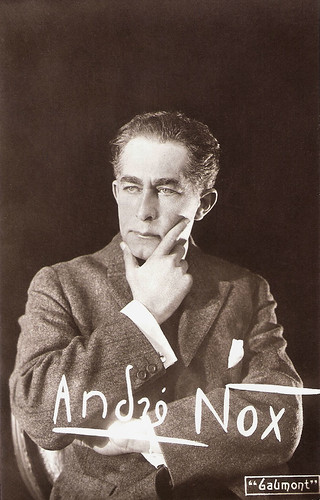
French postcard. Photo: Gaumont.
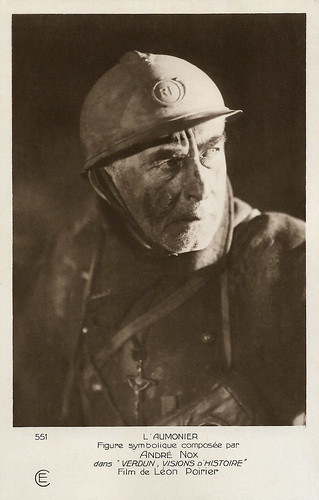
French postcard by Editions Cinémagazine, no. 551. Photo: André Nox as L'aumonier (The Chaplain) in Léon Poirier's silent film Verdun, visions d'histoire / Verdun, historical visions (1928).
André Nox could make the step to sound films. He played Hedy Lamarr’s father in Extase / Ecstasy (Gustav Machatý, 1933), which became a sensation because of a daring sex scene. In 1933, he had a part in the French-German Science Fiction film Le tunnel / The Tunnel (Kurt (Curtis) Bernhardt, 1933), starring Jean Gabin, Madeleine Renaud and Robert Le Vigan. It was the French-language version of the German film Der Tunnel, with a different cast and some changes to the plot. Both were followed in 1935 by an English version.
Such Multiple-language versions were common in the years immediately following the introduction of sound, before the practice of dubbing had come to dominate international releases. Germany and France made a significant number of films together at this time. The film is an adaptation of Bernhard Kellermann's 1913 novel 'Der Tunnel' about the construction of a vast tunnel under the Atlantic Ocean connecting Europe and America. The film's Jewish director, Kurt Bernhardt, had fled Germany following the Nazi takeover, but returned briefly to shoot exterior scenes after being granted special permission by the German government.
Nox also appeared in the drama L'Appel du Silence / The Call of Silence (Léon Poirier, 1936), with Jean Yonnel as the Catholic missionary Charles de Foucauld, who travelled the Sahara and was killed by local bandits. A success was Un grand amour de Beethoven / The Life and Loves of Beethoven (Abel Gance, 1936), a lyrical biography of the classical composer played by Harry Baur. Nox reunited with director-writer Marcel L’Herbier for the dramas Nuits de feu / Nights of Fire (Marcel L'Herbier, 1937), starring Gaby Morlay and La citadelle du silence / The Citadel of Silence (Marcel L'Herbier, 1937), starring Annabella.
He also had a supporting part in the war film J'accuse! / I Accuse (Abel Gance, 1938) starring Victor Francen. It is a remake of the 1919 film of the same name, which was also directed by Abel Gance. Nox also appeared with Dita Parlo and Erich von Stroheim in the French historical drama Ultimatum (Robert Wiene, Robert Siodmak, 1938). With his friend Léon Poirier, André Nox made in Equatorial Africa what turned out to be his final film, Brazza ou l'épopée du Congo / Brazza or the Epic of Congo (Léon Poirier, 1940).
On his return from Africa, France was at war. The defeat in June 1940 and the rise of anti-Semitism forced Nox to withdraw to Brittany. André Nox died on 25 February 1946, a few months after the liberation. He did not get the time to return to the cinema. Nox was 76. His son was the actor Pierre Nonnez-Lopès (1898-1978), known as Pierre Nay.

French postcard by Editions Filma, no. 85. Photo: Studio V. Henry, Paris.
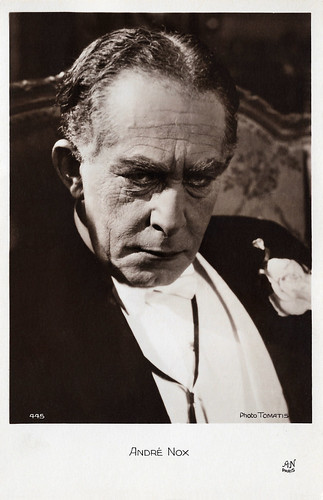
French postcard by A.N., Paris, no. 445. Photo: R. Tomatis. Publicity still for La Possession / Ownership (Léonce Perret, 1929).

French postcard by Editions Cinémagazine, no. 195. Photo: Francesca Bertini and André Nox in La Possession (Léonce Perret, 1929).
Sources: Pascal Donald (CinéArtistes – French), Wikipedia (French and English) and IMDb.
This post was last updated on 9 January 2026.

French postcard by Cinémagazine-Edition, no. 57. Photo: Gibory.

French postcard by Editions Cinémagazine, no. 20.

French postcard. Photo: V. Henry.
The perfect interpreter of poignant dramas
André Nox was born as Abraham André Nonnes-Lopes in 1869 in Paris, France. He was sometimes credited as André Nonnez. He came from a family of Jewish notables and was the nephew of dramaturge and author Georges de Porto-Riche. After his studies, he worked in finance before joining the army at the very beginning of the First World War. Demobilised in 1916, when he was about fifty, he abandoned his business to try a career in cinema, which was booming at the time.
He made his cinema debut for Les Films Succès in the short silent film Sous les phares / Under the lights (1916), directed by André Hugon. He next starred in the silent Western Les chacals / The Jackals (André Hugon, 1917), also starring Louis Paglieri and Musidora. For Huron, he also appeared in Vertige / Vertigo (André Hugon, 1917) starring Régine Marco, the crime film Requins / Sharks (André Hugon, 1917) starring Charles Krauss, Johannes, fils de Johannes / Johannes, Son of Johannes (André Huron, Louis Paglieri, 1918) with Musidora, and La Fugitive / The Fugitive (André Hugon, 1920) starring Marie-Louise Derval.
He signed a contract with Gaumont and acted in Léon Poirier's Âme de Orient / Soul of the Orient (1919), filmed in Nice with Madeleine Sève, Charles Dullin and the very young Josette Day. Then he played in Poirier’s Le Penseur / The Thinker (Leon Poirier, 1920), a philosophical drama based on an idea of Edmond Fleg, with Marguerite Madys and Armand Tallier. Pascal Donald at CinéArtistes calls it “certainly his best role (…) With his pepper and salt hair often shaggy, his face with powerful features and his dark eyes, he is the perfect interpreter of poignant dramas.”
For Germaine Dulac, Nox appeared in her La mort du soleil / The Death of the Sun (1922). He played a musician in Le quinzième prélude de Chopin / The Fifteenth Prelude of Chopin (Victor Tourjanski, 1922). In 1925, he appeared opposite Conrad Veidt in the French silent historical film Le comte Kostia / Count Kostia (Jacques Rober, 1925), set in Tsarist Russia. He had a supporting part in the drama La femme nue / The Nude Woman (Léonce Perret, 1926) starring Iván Petrovich, Louise Lagrange and Nita Naldi, and based on a play by Henry Bataille.
In Germany, he appeared with Carmen Boni, Werner Krauss and S.Z. Szakall in the silent film Der fidele Bauer / The Merry Farmer (Franz Seitz, 1927), based on the 1907 operetta of the same title, and in Die Hölle der Jungfrauen / The Hell of Virgins (Robert Dinesen, 1928) with Werner Krauss and Elizza La Porta. Back in France, he appeared with Betty Balfour and Jaque Catelain in the drama Le diable au Coeur / Little Devil May Care (Marcel L'Herbier, 1928). One of his best films is Verdun, visions d'histoire / Verdun, Historical Visions (Léon Poirier, 1928), a dramatic re-enactment of the battle of Verdun during World War I, as seen by both French and German sides. In Germany, he also made the silent drama S.O.S. Schiff in Not / Ship in Distress (Carmine Gallone, 1929) starring Liane Haid, Alphons Fryland and Gina Manès.

French postcard by Ciné-Cartes G., Paris. Photo: Fox Film / Paris Film Production. André Nox as Claude Saint-Hesme and Henri Baudin as Old Robert, the main character in L'Homme qui pleure (Louis d'Hee, Louis de Verande, 1922). Épisode : L'anathème.

French postcard, by Editions Filma in the Les Vedettes du Cinéma series, no. 85. Photo: Fox-Film.

French postcard. Photo: Gaumont.

French postcard by Editions Cinémagazine, no. 551. Photo: André Nox as L'aumonier (The Chaplain) in Léon Poirier's silent film Verdun, visions d'histoire / Verdun, historical visions (1928).
Hedy Lamarr's father in Extase
André Nox could make the step to sound films. He played Hedy Lamarr’s father in Extase / Ecstasy (Gustav Machatý, 1933), which became a sensation because of a daring sex scene. In 1933, he had a part in the French-German Science Fiction film Le tunnel / The Tunnel (Kurt (Curtis) Bernhardt, 1933), starring Jean Gabin, Madeleine Renaud and Robert Le Vigan. It was the French-language version of the German film Der Tunnel, with a different cast and some changes to the plot. Both were followed in 1935 by an English version.
Such Multiple-language versions were common in the years immediately following the introduction of sound, before the practice of dubbing had come to dominate international releases. Germany and France made a significant number of films together at this time. The film is an adaptation of Bernhard Kellermann's 1913 novel 'Der Tunnel' about the construction of a vast tunnel under the Atlantic Ocean connecting Europe and America. The film's Jewish director, Kurt Bernhardt, had fled Germany following the Nazi takeover, but returned briefly to shoot exterior scenes after being granted special permission by the German government.
Nox also appeared in the drama L'Appel du Silence / The Call of Silence (Léon Poirier, 1936), with Jean Yonnel as the Catholic missionary Charles de Foucauld, who travelled the Sahara and was killed by local bandits. A success was Un grand amour de Beethoven / The Life and Loves of Beethoven (Abel Gance, 1936), a lyrical biography of the classical composer played by Harry Baur. Nox reunited with director-writer Marcel L’Herbier for the dramas Nuits de feu / Nights of Fire (Marcel L'Herbier, 1937), starring Gaby Morlay and La citadelle du silence / The Citadel of Silence (Marcel L'Herbier, 1937), starring Annabella.
He also had a supporting part in the war film J'accuse! / I Accuse (Abel Gance, 1938) starring Victor Francen. It is a remake of the 1919 film of the same name, which was also directed by Abel Gance. Nox also appeared with Dita Parlo and Erich von Stroheim in the French historical drama Ultimatum (Robert Wiene, Robert Siodmak, 1938). With his friend Léon Poirier, André Nox made in Equatorial Africa what turned out to be his final film, Brazza ou l'épopée du Congo / Brazza or the Epic of Congo (Léon Poirier, 1940).
On his return from Africa, France was at war. The defeat in June 1940 and the rise of anti-Semitism forced Nox to withdraw to Brittany. André Nox died on 25 February 1946, a few months after the liberation. He did not get the time to return to the cinema. Nox was 76. His son was the actor Pierre Nonnez-Lopès (1898-1978), known as Pierre Nay.

French postcard by Editions Filma, no. 85. Photo: Studio V. Henry, Paris.

French postcard by A.N., Paris, no. 445. Photo: R. Tomatis. Publicity still for La Possession / Ownership (Léonce Perret, 1929).

French postcard by Editions Cinémagazine, no. 195. Photo: Francesca Bertini and André Nox in La Possession (Léonce Perret, 1929).
Sources: Pascal Donald (CinéArtistes – French), Wikipedia (French and English) and IMDb.
This post was last updated on 9 January 2026.
No comments:
Post a Comment